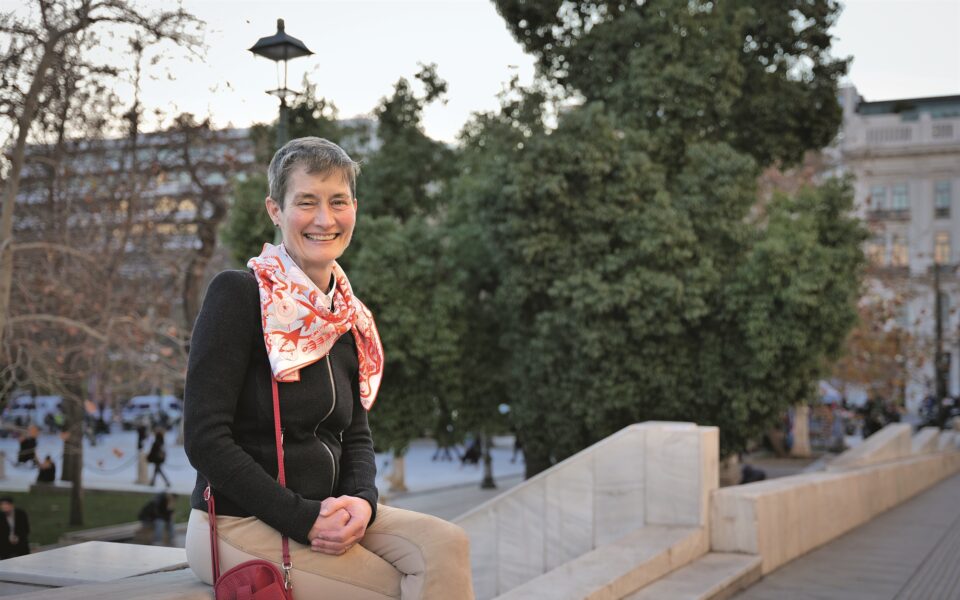Athenian reflections of a Harvard dean
During visit promoting new real estate development program, Sarah Whiting discusses university education and the Greek capital’s prospects

It was Sarah Whiting’s last morning in Athens. For the final day of this dense, week-long tour of Greece, the weather improved and the winter sun shone over Syntagma Square. From her hotel balcony she enjoyed a typical sunny Athenian panorama, with the silhouette of the Parthenon in the background.
Until the usual bustle of the street was suddenly interrupted by the angry voices of demonstrators participating in yet another rally against legislation establishing non-state, non-profit universities in Greece. Whiting grabbed her cellphone and started filming.
In other times, this would have been an unusual image for any senior executive of a major Ivy League university. But for the first female dean of Harvard’s Graduate School of Design, it may have felt almost familiar after an unprecedentedly heated semester on US campuses where protests, extreme polarization and digital bullying took place against the backdrop of the ongoing war in the Middle East. But when the first canister of tear gas hit Vassilissis Sofias Avenue, she remembered exactly where she was. And she knew exactly where the student protests are coming from. I wonder if she noticed the subtle irony?
“It’s not just that it’s unusual for Europe, I would say it’s unusual across the world,” she said, commenting on the resistance to private universities. “Especially given that Greece is part of the European Union, I think that it’s valuable to open up that possibility. Obviously, we’re coming from a non-state, nonprofit university, so we have a particular perspective. I admit to not being an expert on the situation in Greece… but I find that I’m delighted to be part of a university. I have taught at state universities and I have taught at private universities, and I think that both offer value to education.”
She paused to ask: “Was I being too diplomatic?”
Whiting came to Greece at the invitation of architect Alexandros C. Samaras on behalf of the Hellenic Harvard Foundation, with the assistance of Costantza Sbokou-Constantakopoulou, also an architect, in consultation with the Harvard Club of Greece and the Harvard Business School Club of Greece. Two of the main objectives of her visit – in addition to her keen desire to see Greece and Athens for the first time – were to announce and promote a new postgraduate program in real estate development with an emphasis on quality architecture, sustainability and social justice, and to explore opportunities for academic collaboration with the University of Patra’s Architecture Department.
On the eve of the submission of the bill on private universities to Greek Parliament, the news that a Harvard dean was arriving in Athens to discuss, among other things, the prospects of “cooperation” with a Greek university did not go unnoticed. Especially when her itinerary included a meeting with Education Minister Kyriakos Pierrakakis.
When I pointed out the intense interest being shown about a possible partnership between Harvard and the University of Patra, she was quick to address the rumors. “We have alumni who teach at Patra and we made connections with those alumni. And we are trying to talk about research collaborations, but it’s very early stages, and I would not want to imply that there’s any professional, formal relationship. It really is a question of suggesting having faculty meet other faculty and offer up some research collaborations. Just that.”
In any case, sources from both institutions assure Kathimerini that whatever form this good relationship takes, it is in no way related to the government bill. According to Kathimerini, the main focus will be on organizing a series of summer design workshops on the theme of the city, with the participation of students from both Harvard and Patra universities. However, the dean got her first taste of Greek academic reality when her speech to architecture students at the University of Patra was moved to Nafplio due to student occupations taking place at the university.
‘Design is not just that final layer of what makes something seem beautiful… It is exactly how we come together as a society: how we use new materials, how we reuse old materials, how we design for a better climate’
Surprises
Since this was her first trip to Athens and I was sitting there with an architect with a strong academic background in history and politics, I couldn’t help but ask what she expected to find and what she discovered. “Before I get to the heart of your question, I can’t help but share my excitement when I heard on the street or was introduced to people whose names were Pericles or Odysseus. As a Greek, you probably can’t fully understand it, but I assure you that it was something exciting in itself.
“Obviously the Acropolis couldn’t be more monumental, but it’s true that within the city itself you expect more monumentalism, I mean we’re in this square now [Syntagma] and you expect maybe more versions of that, a large public space. And I think one thing that has surprised me is the dearth of public space and the dearth of public greenery. And the fact that Athens is quite low, that was a surprise. Obviously that’s also tied to the height limit because of the Acropolis. So it’s a very dense but low city, but the dearth of shared public spaces and public greenery is startling.”
Are there any exceptions she can think of? “One of the places we visited was the Stavros Niarchos Foundation Cultural Center, with its new library and opera house. It was striking for what it offers for that whole area, not just for the institutions and the production itself, but a big park for people to come to, and incredibly lively. And that it completely recasts that part of Athens.”
Elliniko and Houston
Since the conversation turned to large-scale urban redevelopment, we begin discussing the project in the southern Athens suburb of Elliniko, the site of the former airport, which she also visited. “Yes, we went to the old airport, although we weren’t very lucky with the weather that day. So Elliniko is a very interesting possibility for introducing a large open space into the city,” she said, commenting on the visit.
Whiting goes on to recall a typical scene of Athens’ shortcomings that struck her. “Coming back from Nafplio and entering the city, I noticed a series of grassy plots and building skeletons scattered throughout the urban fabric, and I thought about the possibilities. It reminded me a lot of Houston. So I thought that the conventional way to use such sites, at least in the United States, is to demolish them and build a commercial or residential complex. But today we have alternatives off the beaten track, so I imagined small annexes of the National Library or the Benaki Museum in these neglected places, and what it would mean for people in less privileged neighborhoods of Athens to see a small library or a photography exhibition where they wouldn’t expect it, among apartment buildings and cafes. I think that should be the meaning of architecture and public service in the 21st century,” she said.
The elite bubble
Whiting represents a university that we have come to associate with a privileged class and the elite. How does one open one’s eyes to the needs of society by stepping out of one’s personal or social bubble? “That’s a really interesting question,” she replied. “It’s interesting because, yes, you say ‘Harvard’ and people immediately think ‘elite.’ You say ‘design’ and people think ‘elitism’ too, right? So I have a, let’s say, double narrative to dismantle. And I see that as part of my job because, for me, design is everything. I would say that Harvard, while certainly powerful as a name, is not just for the elites. And so one of my priorities as dean has been to expand access to our school.”
In what way? “First, by raising funds for student financial aid. I will say that I myself benefited from financial aid to attend the schools I attended, and it was the most important investment I made. I paid off my student debt slowly, but it was worth it. Because I believe there is nothing more important than education. Today, 70% of our students receive some form of financial aid. So our school is much more financially diverse than you might imagine, or even than it was not too long ago.”
Is she happy that we are moving away from a rather narcissistic era of star architects and monumental buildings and investing in more holistic approaches that seem more connected to the needs of the current century? “I think we can have both. It’s not necessarily one or the other. Look at the Stavros Niarchos Foundation Cultural Center here in Athens. It’s very beautifully designed, isn’t it? As a building. But it’s also responsible. Design is not just that final layer of what makes something seem beautiful… It is exactly how we come together as a society: how we use new materials, how we reuse old materials, how we design for a better climate.”
Protests and fake news
As for the upheaval on American campuses in an era of extreme political polarization and a presidential election year, she smiled: “It’s not the easiest time to be a dean, but we’ve all been there in our 20s and we understand. But there is an important difference between then and now. Then we had students with picket signs, now we have social media and fake news. That’s why it’s the responsibility of universities to foster dialogue within institutions and allow all voices to be heard. The boundaries between our academic microcosm and real life are not what they were in 1970 or 1990, and we can’t pretend not to see them. The university space must be the antidote to an environment of toxicity and fake news, and it is our responsibility to defend that tradition, if not strengthen it.”





